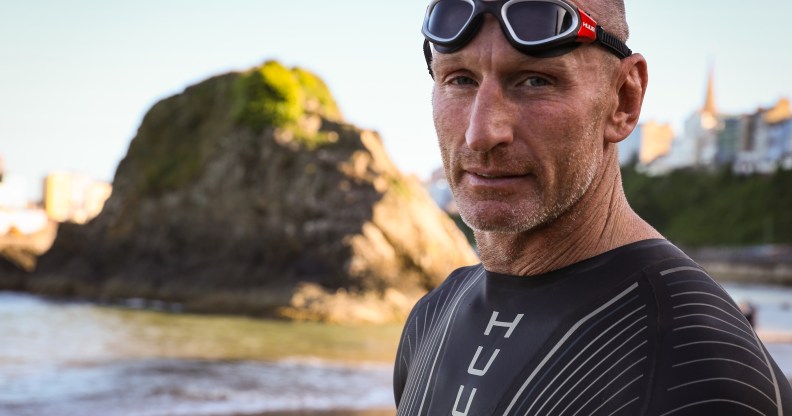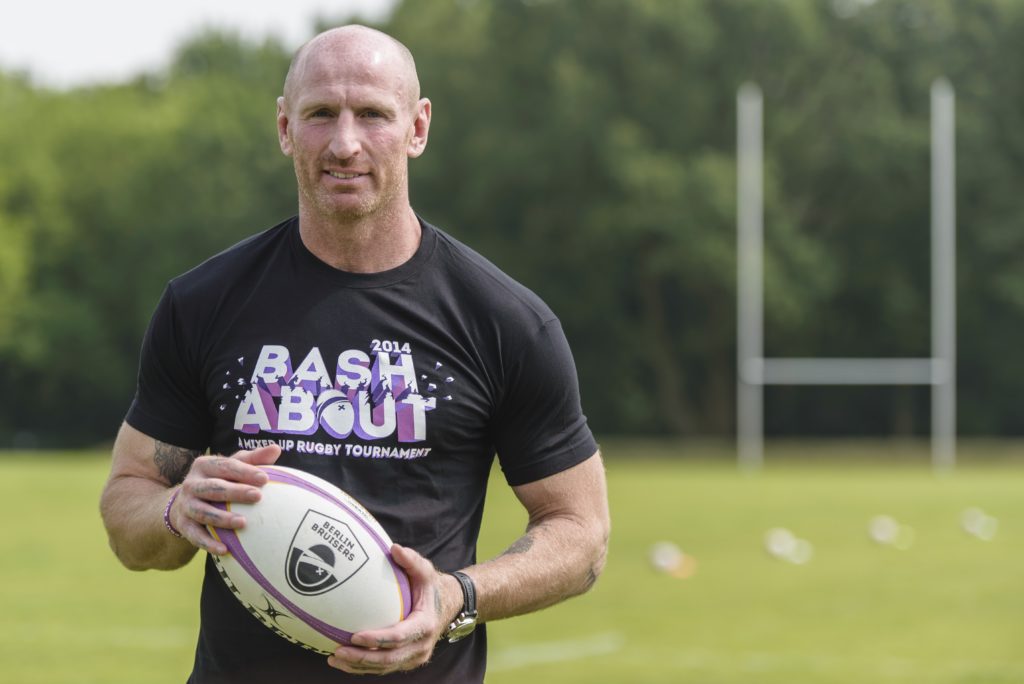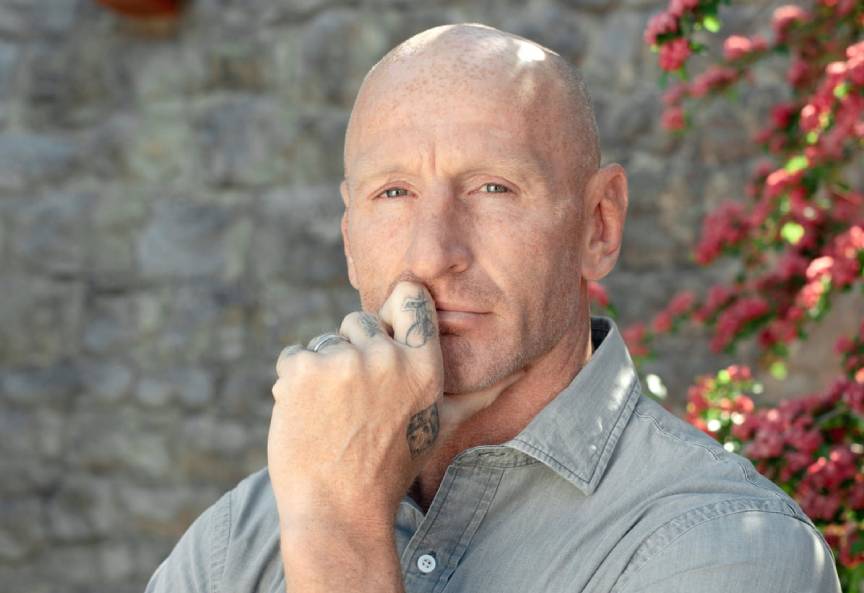Gareth Thomas reveals the insulting question you should never, ever ask someone about their HIV status

Gareth Thomas complete an Ironman in 2019 to combat HIV stigma. (Getty/Huw Fairclough)
In September 2019, the Welsh rugby star and TV personality Gareth Thomas revealed to the world that he was living with HIV.
His hand forced by people threatening to out his HIV status, Thomas decided to use this opportunity to tackle the stigma facing those living with, and affected by, HIV.
As someone living with HIV myself I was both thrilled that we had a very visible HIV-positive celebrity, and heartbroken about the way it happened.
In June 2020, working with the charity Terrence Higgins Trust, of which Gareth is now a patron, and ViiV Healthcare, the Tackle HIV campaign was launched. The campaign aims to tackle stigma and misconceptions around life with the virus.
Gareth sat down with me – Tom Hayes, HIV and sexual health activist – to discuss his journey with HIV and what he feels needs to be done to improve the quality of life for those of us living with, or affected by, HIV.
When he was first diagnosed with HIV, Gareth Thomas thought he was going to die.
The rugby star admits he knew very little about HIV when he was diagnosed, and what he did know was likely wrong: “I used to say to people that my knowledge about HIV was nothing but thinking back I had some ideas even if they were wrong. I used to think I was going to die.
“The generation I come from, and even the younger generations now, see HIV as something that’s life-destroying and imagine somebody with HIV to be very weak and frail. I felt ignorant not knowing how far HIV had come.”
For those of us diagnosed with HIV the experience can be quite traumatic, and with so much information given to you in a short space of time it can be hard to absorb everything.
“To begin with I relied heavily on the doctors and nurses at the hospital but going to hospital when you’re feeling ashamed and embarrassed can be difficult.
“All you want to do is get out of there as quick as you can without being seen.”

Former Welsh rugby captain Gareth Thomas announced he is HIV positive after “evils” threatened to out him. (Clemens Bilan/AFP/Getty)
It took time for Gareth to put his faith in his medical professions, but when he started listening and taking his medication he saw that there was a bright future ahead of him.
“When I was diagnosed I felt that I knew what was going to happen to me – it was a sense of certain death. So, when even medical professionals are telling you something different it’s very hard to change your mind,” he said.
“For a good six to eight months I didn’t listen to a word a that they were telling me, but when I did start listening to them and started taking my medication I realised that my life could be better than I thought it could be.”
The rugby star kept his HIV-positive status a secret, even from his family.
Sharing your HIV status can be difficult, especially when it comes to family members. Gareth Thomas kept his status secret from his parents out of fear of rejection.
“I justified not telling them by convincing myself that they weren’t going to understand. I’ve relied heavily on my parents over the years and if I’d been rejected by them then I’m not sure what I would have done.
“So, because I expected the worst I decided to keep it a secret from them and everybody else.”
Learning the meaning behind U=U (undetectable = untransmittable) was “a life changing moment” for Gareth, and a message that he continues to “share and celebrate”.
“It is something that it took time to get my head around but has enabled me to carry on living a happy and healthy life. It’s something that everyone, whether they’re affected by HIV or not, needs to understand.”
Talking about the power behind U=U, Gareth said it has the power to improve our society: “U=U is a statement that can help us create a society where people don’t feel that they have to hide or fear their HIV, or avoid sharing a hug or a drinking glass – or any of the other mythical ways people still think HIV can be transmitted.”
The barrier around challenging these persistent misconceptions and myths according to Gareth is how people perceive people living with HIV: “They don’t think that this unimaginable thing could happen to them.
“People assume they know, usually through hearsay, all they need to know about HIV and the people living with it. It’s hard to stop people making snap judgements based on their incorrect information, so when some positive news comes along it can be difficult for them to believe.”
If we all have the knowledge then we all have the power to create a better society for everyone.
Despite the fact that people living with HIV can now live healthy and happy lives, it remains a stigmatised and misunderstood subject.
“Unless people start having open conversations about HIV it’s always going to be this ‘dirty’ subject that people don’t feel comfortable asking questions about,” he said.
“This is a subject that people feel only affects a niche group of people, such as gay men and Black Africans, but until people realise that this is a virus that affects society in general then there’s always going to be stigma, stereotypes and misunderstanding.
“If we all have the knowledge then we all have the power to create a better society for everyone.”

Gareth Thomas says that even today, he still encounters stigma. (Supplied)
Gareth met his now husband not long after he was diagnosed. Sharing his HIV status with him was difficult: “I was telling someone I’d really fallen for that and someone that I knew didn’t have same level of knowledge about HIV that I had. I thought he was going to reject me – I was really fearful.”
But these difficult conversations continue for most of the over 101,000 people living with HIV in the UK.
Gareth Thomas believes language is key in tackling stigma around HIV.
Gareth Thomas spends much of his time speaking to people facing HIV related stigma in a bid to better understand how we can tackle the issue – and language is key.
“I was talking to someone with HIV yesterday who was struggling with the reactions and rejections he was facing when trying to meet people online.
“It really hurts me that the gay community, a community that I love and respect, can be so harsh with their words and not understand the detrimental impact of asking someone if they’re ‘clean’.
“Do the people who ask that question realise how dirty they make people feel when they receive and have to reply to those messages?
“Just ask me if I’m HIV positive or if I know my status – don’t ask if I’m ‘clean’.”
People who are struggling to reconnect with society, to make new friends and find relationships after a HIV diagnosis, can be set back by thoughtless words.
Finding out that such language is still being used by a community of people Gareth believes “already understand what stigma is and who have fought for equality” is “very thoughtless”.
“People who are struggling to reconnect with society, to make new friends and find relationships after a HIV diagnosis, can be set back by thoughtless words.
“To those of us with a platform in the LGBT+ community, even if you’re not HIV positive: use your platform to tell our community to stop using this language.”
Reacting to last month’s news that PrEP is finally to be rolled out on the NHS in England, Gareth said: “There are many communities that will benefit from having access to PrEP, and the health service in general will benefit too.”
For Gareth Thomas, it’s something he’s kept an eye on as part of his role in the HIV Commission: “We’re hoping to make England the first country with zero HIV transmissions in the next ten years so this will be an important tool to help us achieve this.
“But more importantly it will help a community of people not have to go through the stigma and misunderstanding that still surrounds this virus.”
I asked Gareth that looking back, if he could give a message to his 16-year-old self about HIV, what would it be?
“Don’t fear rejection because of your sexuality or HIV status. It’s better to be your authentic self, with all the good and bad bits, than to be liked for being a version of myself that I thought other people wanted me to be.”
Finally, what one message would he like to the PinkNews readers to take away from this interview?
“The LGBT+ community knows what it is to fight for equality and knows how derogatory words can really hurt – it’s time we educate ourselves on HIV and stop using language such as ‘clean’.
“We know better and we can do better.”

